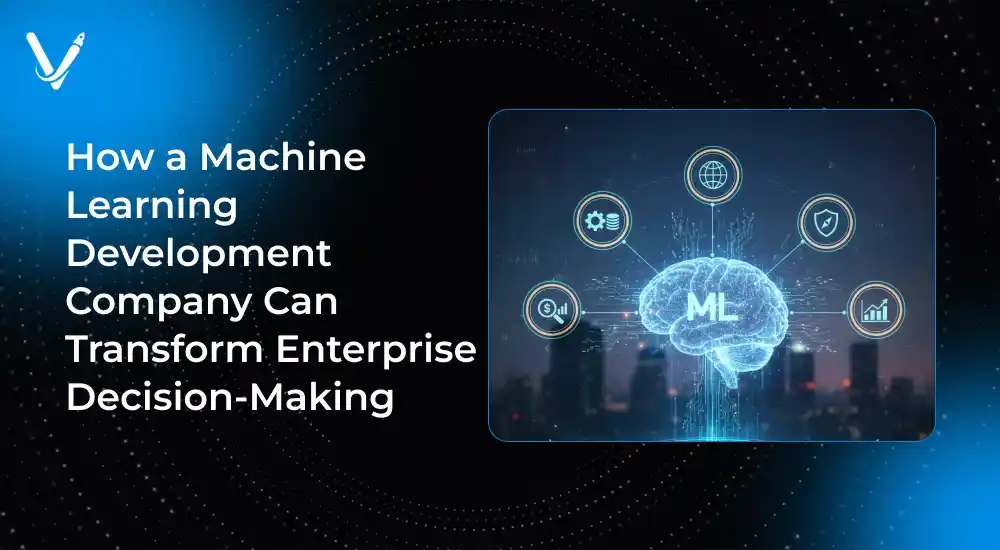How a Machine Learning Development Company Can Transform Enterprise Decision-Making


- Nov 6, 2025



Key Takeaways
In today’s data-driven world, decisions define destiny. Enterprises that can interpret massive data volumes faster and more accurately gain a decisive competitive edge. But with growing data complexity, manual analysis and conventional business intelligence tools often fall short. This is where machine learning development companies become the architects of enterprise transformation.
Machine learning (ML) is not just about automating processes; it’s about evolving decision-making into an intelligent, adaptive system. With the right ML models, enterprises can uncover hidden patterns, predict trends, and make informed choices backed by evidence rather than intuition.
Partnering with a machine learning development company allows organizations to move beyond reactive decisions and enter the realm of predictive, proactive, and prescriptive strategies. This article explores how these specialized technology partners reshape enterprise decision-making across industries, the technologies involved, the strategic advantages gained, and how Vasundhara Infotech empowers businesses to adopt AI-driven intelligence for growth and innovation.
Enterprises generate enormous volumes of data every day—customer interactions, sales records, operational logs, supply chain data, and more. Traditional analytics can process this data but often lack the predictive and adaptive intelligence that modern enterprises need.
Machine learning bridges this gap by enabling algorithms to learn from data, recognize patterns, and make intelligent decisions without explicit programming. Over time, these models become smarter, continuously improving as they process new information.
This leads to a transformation in decision-making—decisions become faster, more accurate, and deeply personalized. For enterprises, that means identifying risks before they occur, optimizing resources automatically, predicting market shifts, and making choices that drive measurable impact.
A machine learning development company helps organizations operationalize these models, integrating them seamlessly into business workflows, enabling smarter decisions across every department—from finance and HR to marketing and logistics.
In a competitive digital economy, enterprises must be agile, data-savvy, and forward-looking. Machine learning supports this by empowering systems to continuously learn and adapt. Let’s look at how it revolutionizes enterprise dynamics.
Data by itself is just a collection of numbers and text. The real value lies in interpretation. ML algorithms can process structured and unstructured data at scale—extracting patterns, correlations, and anomalies that human analysts might overlook.
For instance, a retail enterprise can analyze customer purchase history to predict future buying behavior. Similarly, a manufacturing firm can anticipate machinery failures based on sensor data, preventing costly downtime.
Machine learning personalizes decision-making for different departments and roles. Marketing teams get tailored campaign insights, sales teams receive predictive lead scoring, and finance departments can forecast revenues with higher accuracy.
This personalization ensures decisions are context-aware and data-backed, helping enterprises act with confidence.
While traditional analytics answers “what happened,” machine learning answers “what will happen” and “what should we do about it.” Predictive models forecast outcomes based on historical data, while prescriptive analytics recommends the best course of action.
For example, supply chain ML models can predict disruptions and automatically suggest alternative suppliers or shipping routes to maintain operational continuity.
Building a successful ML ecosystem requires expertise across data engineering, algorithm selection, model training, validation, deployment, and continuous optimization. A machine learning development company provides the specialized skills, frameworks, and infrastructure needed to bring these systems to life.
Here’s how such a company empowers enterprise decision-making:
Before a single model is trained, data must be gathered, cleaned, and structured. ML development firms implement data pipelines, ensuring that information flows seamlessly from multiple sources into a usable format.
This step is critical because model accuracy depends heavily on data quality. Expert teams also design ETL (Extract, Transform, Load) processes and employ modern tools like Apache Spark or TensorFlow Data Validation to ensure consistency.
The next phase involves selecting the right algorithm for the enterprise’s problem—supervised learning for classification, unsupervised learning for clustering, reinforcement learning for dynamic optimization, and so on.
Machine learning development companies use frameworks such as PyTorch, Scikit-learn, or TensorFlow to train models using historical enterprise data. They fine-tune hyperparameters, optimize loss functions, and evaluate model performance using metrics like precision, recall, and F1 scores.
Once the model performs well in testing, it must be integrated into enterprise systems such as ERP, CRM, or data lakes. This involves containerization (e.g., Docker), cloud deployment (AWS, Azure, GCP), and building APIs for real-time predictions.
A robust MLOps (Machine Learning Operations) pipeline ensures continuous model improvement, versioning, and monitoring. The result is a dynamic ecosystem where decisions are informed by live, intelligent insights.
As enterprises grow, so does their data. Machine learning companies ensure that models can scale horizontally and vertically. They also implement data governance, access control, and compliance measures to secure sensitive enterprise data while meeting industry standards like GDPR or HIPAA.
ML models can drift over time as new data patterns emerge. A professional machine learning development company continuously monitors performance, retrains models, and enhances their accuracy to keep decision-making relevant and reliable.
When enterprises adopt machine learning effectively, the results are transformative. Here are key benefits that demonstrate its power in improving enterprise decision-making:
ML-powered systems can process millions of data points instantly, providing real-time insights that help leaders make informed choices swiftly. Enterprises no longer rely on static reports but on adaptive dashboards that evolve with new information.
By removing human error and subjective bias, ML algorithms deliver consistent, evidence-based decisions. When trained on diverse, balanced datasets, they offer a clearer, fairer view of enterprise realities.
Automation of repetitive tasks—such as data entry, inventory tracking, or anomaly detection—frees teams to focus on strategy. Predictive maintenance, demand forecasting, and dynamic resource allocation cut operational costs significantly.
Personalized product recommendations, sentiment analysis, and real-time support improve customer satisfaction and retention. Machine learning turns every customer interaction into a learning opportunity, fine-tuning experiences continuously.
Financial and cybersecurity teams benefit immensely from machine learning. Algorithms detect unusual patterns, prevent fraudulent transactions, and flag potential compliance risks before they escalate.
Machine learning’s influence spans every industry. Let’s explore real-world examples of how enterprises are leveraging ML for superior decision-making.
Banks use ML for credit scoring, fraud detection, and algorithmic trading. Predictive analytics help identify risky borrowers, while anomaly detection algorithms prevent unauthorized transactions.
Automated customer segmentation allows personalized loan offers, enhancing client engagement and cross-selling opportunities.
In manufacturing, predictive maintenance has become a cornerstone of efficiency. ML models analyze sensor data from equipment to forecast potential breakdowns, enabling preemptive repairs.
Quality control systems powered by computer vision ensure products meet standards, while supply chain optimization models minimize delays and costs.
ML helps hospitals and clinics make diagnostic, operational, and administrative decisions with greater accuracy. Predictive models can identify disease risks, while NLP-based systems extract insights from medical reports.
Machine learning development companies also assist in building AI-powered healthcare apps for patient monitoring, drug discovery, and personalized treatment planning.
Retailers utilize ML for inventory management, price optimization, and personalized marketing. Predictive algorithms forecast demand trends, helping enterprises avoid overstock or shortages.
Recommendation systems analyze user behavior to deliver hyper-personalized product suggestions, increasing sales and customer loyalty.
In logistics, ML optimizes route planning, fleet management, and delivery scheduling. Predictive analytics anticipate delays due to weather or traffic, ensuring on-time deliveries.
For global enterprises, ML-powered supply chain analytics enhances transparency, risk mitigation, and cost control.
Enterprises leverage ML for talent acquisition, employee performance evaluation, and workforce optimization. Predictive algorithms help identify potential high performers and reduce employee turnover through proactive engagement strategies.
Energy firms apply ML for demand forecasting, energy distribution, and asset optimization. By predicting energy consumption patterns, companies can reduce waste and improve sustainability initiatives.
Machine learning is more than a technology—it’s a strategic advantage. Enterprises that integrate ML into their core decision-making gain the ability to anticipate change, optimize processes, and innovate continuously.
Predictive analytics enables long-term planning based on accurate trend projections. Businesses can anticipate market shifts, allocate budgets more effectively, and reduce uncertainty in strategic moves.
By analyzing competitors’ actions, pricing strategies, and market sentiment, ML tools provide enterprises with valuable competitive insights. Leaders can craft agile strategies that stay ahead of the curve.
Machine learning helps decode customer preferences at granular levels. This allows enterprises to design products, services, and experiences that align perfectly with evolving needs—fueling innovation.
When machine learning becomes integral to operations, decision-making evolves into a culture. Teams across departments rely on real-time insights, not assumptions, leading to collaboration and accountability.
While the benefits are vast, implementing ML solutions within enterprises can present challenges. A machine learning development company helps overcome them effectively.
Many enterprises struggle with scattered data sources. ML experts build unified data architectures that connect ERP, CRM, IoT devices, and cloud databases—creating a single source of truth.
ML requires expertise in data science, engineering, and AI frameworks. Partnering with a specialized firm provides access to skilled teams who can handle complex model development and deployment.
Business leaders often hesitate to rely on “black-box” models. Modern ML solutions now include explainable AI (XAI) frameworks that make model reasoning transparent, building confidence in decisions.
Machine learning companies help enterprises scale models efficiently using cloud-based MLOps, reducing infrastructure costs while ensuring high availability.
Selecting the right partner determines the success of your ML transformation journey. Here are key factors to consider:
At Vasundhara Infotech, we help enterprises unlock the true potential of machine learning through end-to-end development, integration, and optimization services.
Our ML experts craft tailored solutions that align with your unique goals—whether you need predictive analytics for business forecasting, recommendation systems for customer engagement, or intelligent automation for operational efficiency.
We focus on:
With Vasundhara Infotech as your machine learning partner, your enterprise gains the power to make decisions that are faster, smarter, and more accurate—fueling innovation and growth across every level.
Machine learning will continue to redefine how enterprises think, plan, and act. Emerging trends like generative AI, reinforcement learning, and autonomous decision systems are taking intelligence to new dimensions.
Enterprises that embrace ML today position themselves as leaders of tomorrow—able to adapt instantly, innovate continuously, and compete effectively in dynamic global markets.
The fusion of human intelligence and machine learning is not about replacing people; it’s about empowering them to make decisions that are more strategic, data-informed, and impactful.
Decision-making lies at the heart of every enterprise, and machine learning has become the catalyst for transforming it into a science of precision and foresight. By turning data into dynamic intelligence, enterprises can predict outcomes, reduce risks, and maximize opportunities.
A machine learning development company like Vasundhara Infotech ensures this transformation happens seamlessly—integrating ML into your systems, operations, and culture. The result is a smarter enterprise capable of navigating uncertainty with confidence and speed.
Now is the moment to act. Harness the power of machine learning and lead your enterprise into a new era of intelligent, data-driven decision-making with Vasundhara Infotech.
Copyright © 2026 Vasundhara Infotech. All Rights Reserved.